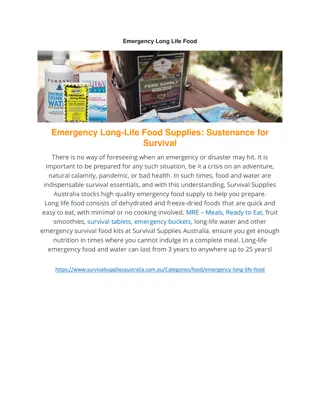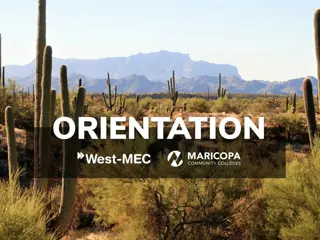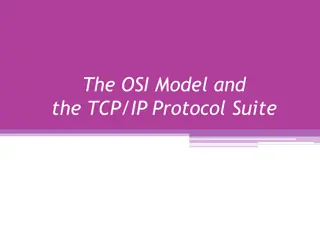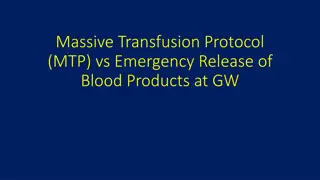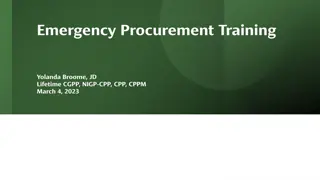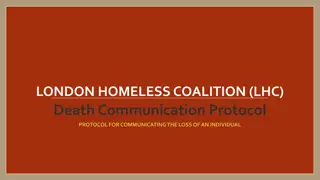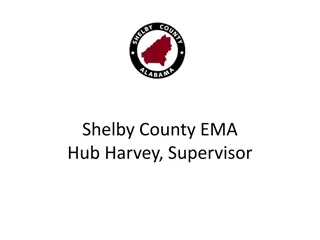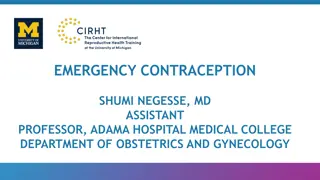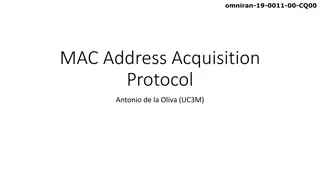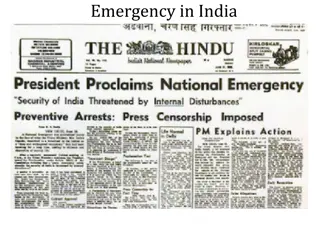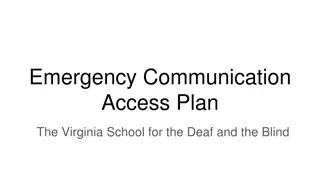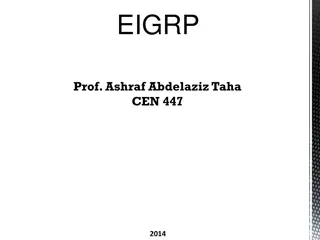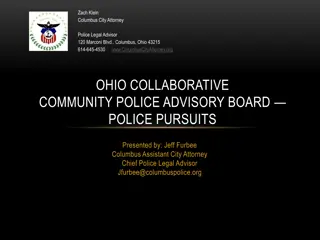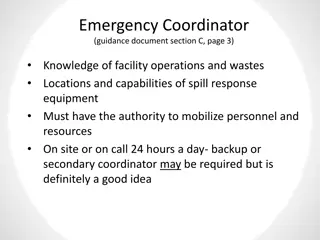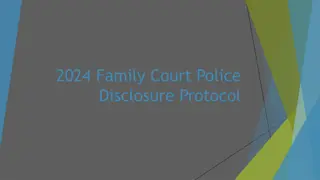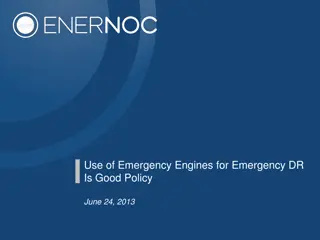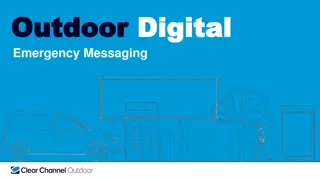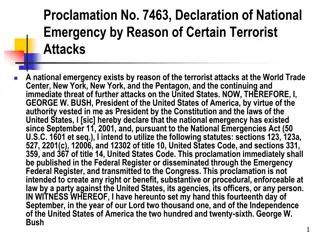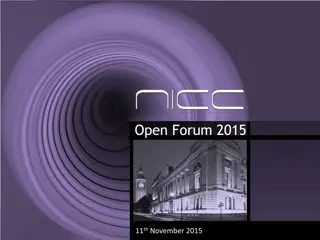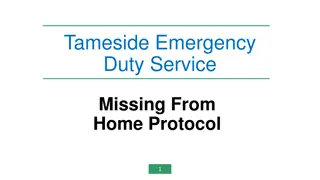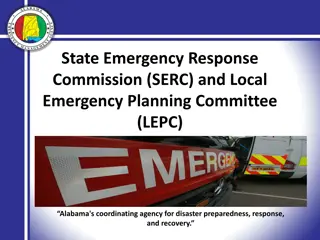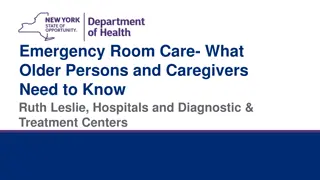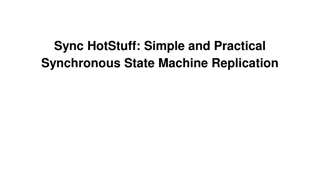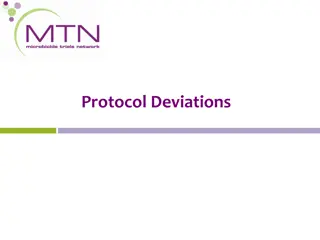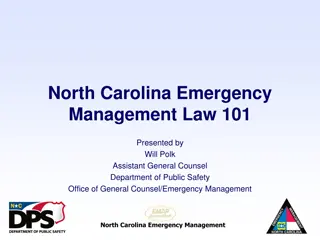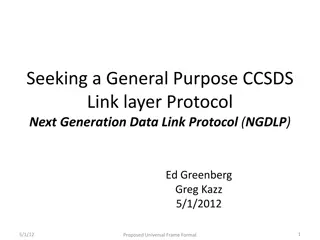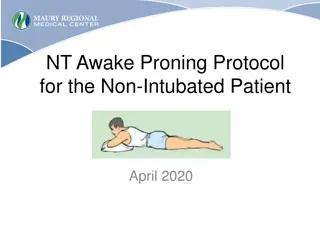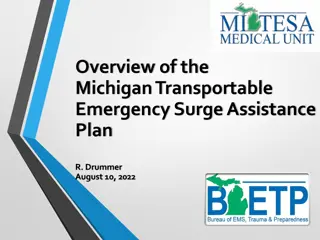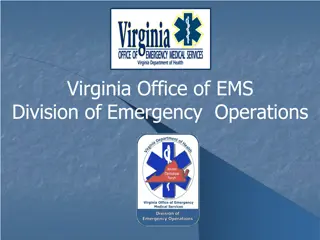Adaptive Tree-based Convergecast Protocol
Adaptive tree-based protocol for managing overlay networks in heterogeneous networks. It proposes improvements to the existing Tree-Based Convergecast Routing (TBCR) protocol by considering additional parameters such as RTT, power consumption, link stability, and link mobility to optimize routing de
32 views • 12 slides
Addressing 5G Signaling Protocol Vulnerabilities
The 8th meeting of the Communications Security, Reliability, and Interoperability Council to discuss and address security vulnerabilities in the newly adopted 5G signaling protocol, HTTP/2. Learn about potential risks, recommended safeguards, and the prevention of these vulnerabilities in the upcomi
3 views • 85 slides
Suicide Prevention & Postvention Protocol
This protocol provides practical advice and support for schools and colleges in Hampshire to navigate the aftermath of a suspected suicide among students or staff members. It includes guidance on interventions, critical incident response, and resources to support the bereaved. Key stages of the post
0 views • 37 slides
Emergency Response Proposed Rule - Worker Safety and Health Conference
The Emergency Response Proposed Rule aims to update regulations for worker safety and health, expanding coverage to include technical search and rescue and emergency medical service entities. The rule proposes replacing the existing Fire Brigades standard with an Emergency Response standard. Federal
2 views • 23 slides
Emergency Long Life Food (Emergency Long-Life Food Supplies: Sustenance)
There is no way of foreseeing when an emergency or disaster may hit. It is important to be prepared for any such situation, be it a crisis on an adventure, natural calamity, pandemic, or bad health. In such times, food and water are indispensable survival essentials, and with this understanding, Sur
1 views • 1 slides
Emergency Medical Technician Program Details
This program offers a one-year Emergency Medical Technician (EMT) education with courses in College/Career Readiness, CPR/Basic Cardiac Life Support, Emergency Medical Responder, Basic Emergency Medical Technology, Applied Practical Studies, and Emergency Medical Technology Practicum. The schedule,
0 views • 33 slides
Understanding OSI Model and TCP/IP Protocol Suite
Explore the concept of layering in data communication, comparing the OSI model and TCP/IP protocol suite. Learn about protocol layers, protocol hierarchies, and the functionality of each layer in these models. Discover the interrelationships between layers and the evolution from OSI to TCP/IP.
5 views • 57 slides
Difference Between Massive Transfusion Protocol (MTP) and Emergency Release of Blood Products
Both MTP and emergency release are protocols for immediate blood product release without needing a type/screen. However, MTP involves fixed product dispensing, while emergency release allows customization. MTP requires contacting the blood bank to activate or deactivate, while emergency release requ
0 views • 6 slides
Emergency Procurement Procedures and Definitions for Public Safety
Understanding emergency procurement procedures is crucial in situations where immediate action is required to address threats to public health, welfare, or safety. This includes making emergency procurements for equipment, supplies, services, construction items, or professional/consultant services u
0 views • 12 slides
London Homeless Coalition (LHC) Death Communication Protocol
In 2014, the Memorial Committee of the London Homeless Coalition (LHC) established the Death Communication Protocol to acknowledge, share, and address the loss of individuals experiencing homelessness. The protocol aims to inform partnering organizations of confirmed or unconfirmed deaths, support g
0 views • 12 slides
Understanding Mobile Computing and TCP/IP Protocol Suite
Mobile computing is crucial for continuous internet connectivity regardless of physical location. The TCP/IP protocol suite, consisting of Transmission Control Protocol (TCP) and Internet Protocol (IP), forms the backbone of internet infrastructure. IP addressing and mobility challenges are addresse
1 views • 51 slides
Emergency Planning and Response in Shelby County
Shelby County Emergency Management Agency (EMA) Hub, under the supervision of Supervisor Harvey, plays a crucial role in local emergency planning and response. The Local Emergency Planning Committee (LEPC) focuses on building strong relationships to ensure local success. Recent amendments to the Eme
0 views • 5 slides
Understanding OSI Model and TCP/IP Protocol Suite in Computer Networking
This chapter explores the OSI model and TCP/IP protocol suite, delving into protocol layers, addressing mechanisms, and network components. It highlights the interface between layers, functions of each layer in the OSI model, and compares TCP/IP protocol suite layers with OSI model layers. The discu
0 views • 30 slides
Emergency Contraception Overview: Types, Usage, and Effectiveness
This presentation by Dr. Shumi Negesse provides an in-depth look at emergency contraception, including its definition, types of emergency contraceptives available, when to prescribe them, common side effects, and their effectiveness. The audience will learn about different emergency contraceptive pi
0 views • 23 slides
MAAP Protocol Overview in IEEE 1722: Address Acquisition and Message Format
The MAAP (Multicast Address Acquisition Protocol) is defined in IEEE 1722 for time-sensitive applications in bridged local area networks. It involves acquiring multicast addresses through claiming, probing, and defending messages. MAAP enables dynamic allocation of addresses and defending against co
1 views • 8 slides
IEEE 802.11-20/1761r1 Ranging Protocol for 11bd
This document outlines the ranging protocol proposed for IEEE 802.11-20/1761r1, focusing on RTT-based ranging leveraging multi-channel operation. By integrating the 11az ranging protocol, it enables flexible and low-overhead application in 11bd for improved accuracy in ITS bands. The protocol includ
1 views • 13 slides
Emergency Provisions in the Indian Constitution: A Historical Overview
The emergency provisions in the Indian Constitution, including National/War Emergency under Article 352 and Constitutional Emergency in States under Article 356, have had significant historical implications. The period of Emergency declared from June 25, 1975, to March 21, 1977, during Indira Gandhi
0 views • 7 slides
Enhancing Emergency Communication Access Plan at Virginia School for the Deaf and the Blind
Virginia School for the Deaf and the Blind (VSDB) is taking steps to improve its emergency communication access plan to ensure all individuals on campus, including those who are deaf, hard of hearing, blind, or vision impaired, have full access to emergency alerts and instructions. The plan includes
2 views • 14 slides
Understanding EIGRP: A Comprehensive Overview
Enhanced Interior Gateway Routing Protocol (EIGRP) is a dynamic routing protocol providing various advantages to network administrators. It is a classless routing protocol supporting VLSM and is considered an Interior Gateway Protocol (IGP). EIGRP uses advanced distance vector routing and is known f
1 views • 5 slides
Ohio Revised Code Sections on Emergency Vehicle Regulations
Explore the Ohio Revised Code sections pertaining to emergency vehicles, covering exemptions for emergency vehicle drivers in response to emergency calls, procedures for proceeding past red signals, and speed limit exceptions. These regulations ensure that emergency vehicles can navigate safely whil
0 views • 21 slides
Essential Emergency Coordinator Guidelines for Facilities
This guidance document outlines the key responsibilities and requirements for an emergency coordinator at a facility. It covers the knowledge needed for facility operations, spill response equipment, authority to mobilize resources, and protocols for handling fire, spills, and other incidents. Addit
0 views • 7 slides
Understanding SFTP Server Functionality with ACS 5.x by Mohammad Azharuddin AAA Team
SFTP (SSH File Transfer Protocol) is a secure network protocol for file access, transfer, and management over reliable data streams. It enhances security by extending the SSH protocol and can be implemented using a reliable 8-bit byte stream protocol. SFTP commands are sent as 4 ASCII letters follow
4 views • 23 slides
Enhanced Family Court Police Disclosure Protocol for 2024
The 2024 Family Court Police Disclosure Protocol addresses key issues identified in the 2013 protocol, emphasizing timely and proportionate requests for material. Changes include a new checklist for the judiciary, guidance notes, and revised processes for litigants in person. The protocol provides c
1 views • 19 slides
Analysis of Emergency Engines and Ozone Levels in Demand Response Events
Use of emergency engines in demand response (DR) events does not correlate with high ozone levels, as shown by a study conducted from 2005 to 2011 across various regions like PJM, ISO NE, NYISO, and ERCOT. The analysis reveals that emergency DR events do not align with high ozone days, indicating no
0 views • 12 slides
Instant Communications in Emergency Situations: Clear Channel Network Protocol
The Gulf Coast of Texas faces frequent tropical storms and hurricanes, requiring clear communication strategies. Clear Channel's network of digital units provides vital messaging during emergencies, ensuring public safety. The network protocol involves coordinating messages with emergency management
0 views • 22 slides
Essential Elements of Clinical Trial Protocols
Understanding the key components of a clinical trial research protocol is essential for conducting successful studies. This includes identifying session objectives, discussing trial protocol contents, exploring observational study elements, and learning about reporting guidelines. Study objectives f
1 views • 25 slides
Understanding National Emergency Declarations and Emergency Powers Laws
This content delves into the legal aspects of national emergency declarations, emergency powers laws, and judicial review of emergency declarations. It covers the purpose, termination, historical context, congressional oversight, and impact on presidential powers. It also explores the complexities o
0 views • 6 slides
Emergency Location Working Group Initiatives and Standards
The Emergency Location Working Group focuses on securely providing accurate location information for emergency calls in the UK. They address standards, publications, and current focus areas such as ETSI architecture review and protocols for locating VoIP emergency calls. The group collaborates with
0 views • 6 slides
A-29 Emergency Landing Gear Procedure
This emergency procedure outlines steps to follow in case of low pressure in the landing gear accumulator of the A-29 aircraft. It details actions to take for the emergency gear situation, including the response for low emergency brake accumulator pressure and the procedure to follow when the landin
0 views • 4 slides
Tameside Emergency Duty Service Missing From Home Protocol
The Tameside Emergency Duty Service (EDS) provides support for missing young persons outside of standard office hours. Contact is made through the Emergency Control Room with specific details required for reporting a missing incident. The EDS Social Worker follows up with the residential home to gat
0 views • 9 slides
Alabama State Emergency Response Commission (SERC) and Local Emergency Planning Committee (LEPC)
Alabama's State Emergency Response Commission (SERC) and Local Emergency Planning Committee (LEPC) are key agencies responsible for disaster preparedness, response, and recovery. The SERC, formed by Executive Order Number 4, appoints agencies like the Alabama Emergency Management Agency (AEMA) and A
0 views • 14 slides
Essential Guide to Emergency Room Care for Older Persons and Caregivers
Older persons and their caregivers need to be well-informed about emergency room care. This guide covers key aspects such as services provided in emergency departments, differences between emergency, inpatient, and outpatient care, observation billing, what to bring to the ED, and the CARE Act for c
0 views • 14 slides
Sync HotStuff: Practical Synchronous State Machine Replication
Sync HotStuff is a practical synchronous protocol that tolerates Byzantine replicas and handles weaker synchrony models. It overcomes issues of requiring a large number of rounds and lock-step execution. The protocol ensures safety by committing blocks and guarantees liveness by continuing to commit
0 views • 15 slides
Understanding Protocol Deviations in Clinical Trials
Protocol deviations are expected occurrences in clinical trials that may arise from site or participant actions. It is crucial for research teams to identify, report, and learn from these deviations to ensure the integrity and safety of the study. Mechanisms for identifying and reporting deviations,
0 views • 16 slides
Understanding North Carolina Emergency Management Law 101
The North Carolina Emergency Management Law 101, presented by Will Polk, Assistant General Counsel, delves into the measures taken by governments and the populace at various levels to minimize the adverse effects of emergencies. The law covers the planning, prevention, mitigation, warning, movement,
0 views • 46 slides
Understanding OSI Model and TCP/IP Protocol Suite in Computer Networking
This content delves into the OSI model and TCP/IP protocol suite, highlighting the protocol layers, addressing mechanisms, and communication scenarios. It explores the functions of each layer, the interface between layers, and compares the TCP/IP layers with the OSI model. Through examples and illus
0 views • 46 slides
Seeking a General-Purpose CCSDS Link Layer Protocol: Next-Generation Data Link Protocol (NGDLP)
This document discusses the proposed Universal Frame Format for a next-generation data link protocol, focusing on major questions about transfer frames, Protocol Link Transmission Unit (PLTU), and Universal Transfer Frame Structure. It explores topics such as frame formats, telemetry transfer frames
0 views • 24 slides
NT Awake Proning Protocol for Non-Intubated Patients
This protocol outlines the benefits and procedure for prone positioning in non-intubated patients experiencing mild to moderate hypoxemia. It highlights patient eligibility criteria, equipment required, and considerations for nursing care. The protocol emphasizes improving oxygenation by promoting a
0 views • 11 slides
Michigan Transportable Emergency Surge Assistance Plan Overview
Michigan Transportable Emergency Surge Assistance (MI-TESA) Plan is a state resource established for emergency preparedness, featuring a mobile field hospital with various facilities and equipment stored strategically in Michigan. The primary healthcare mission of MI-TESA is to augment existing heal
0 views • 14 slides
Virginia Office of EMS Division of Emergency Operations
The Virginia Office of EMS Division of Emergency Operations is a crucial entity responsible for coordinating responses to various emergencies, including natural disasters, man-made incidents, and public health crises. Led by dedicated staff members, the division focuses on strategic initiatives to e
2 views • 21 slides




